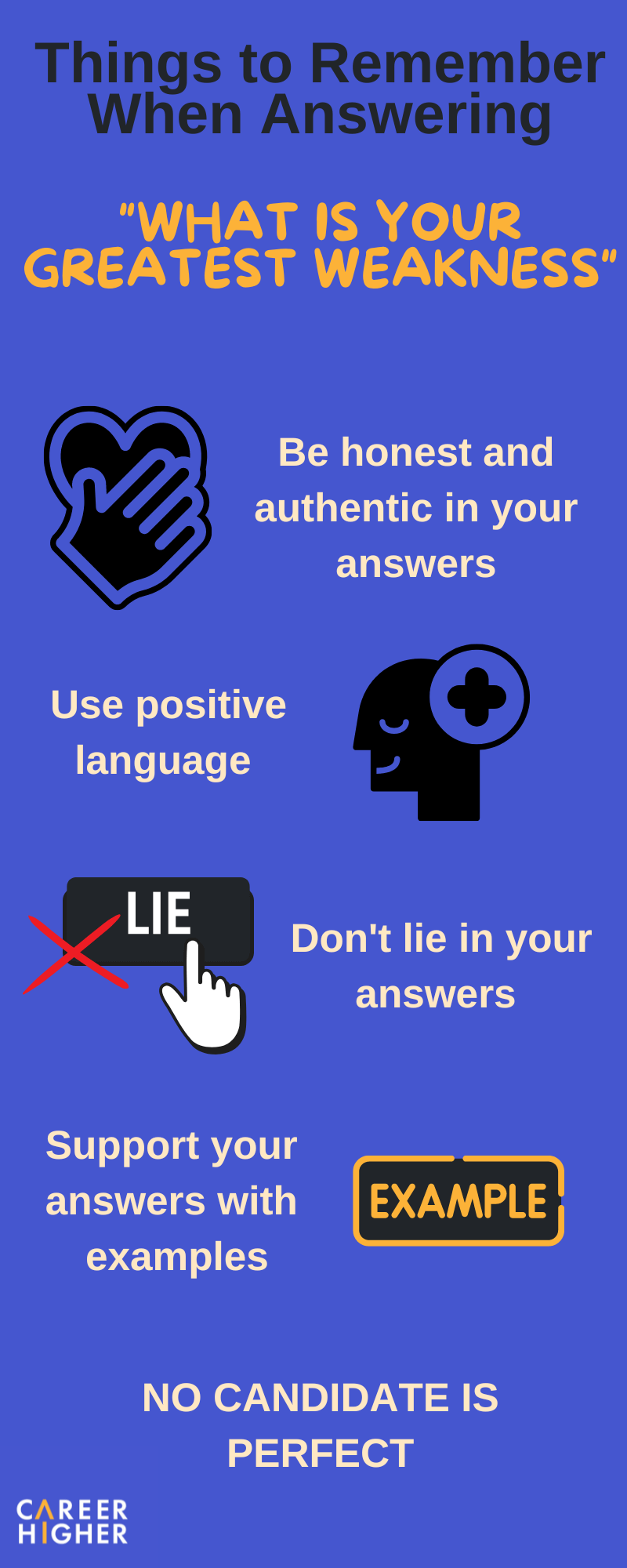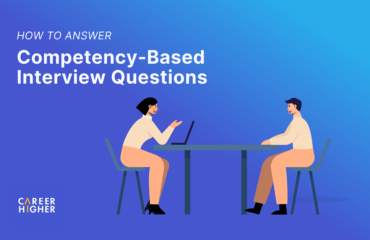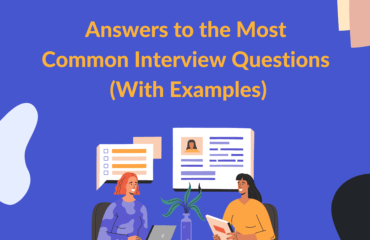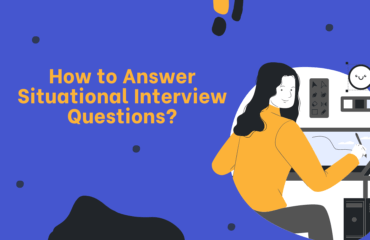Table of Contents
If you are preparing for upcoming interviews for your career change, a popular question that you should know how to respond to is ”What is your greatest weakness?”. As a candidate, you may find this to be one of the most challenging questions to answer in an interview.
Who wants to talk about their weaknesses when your aim is to establish yourself as the best candidate for a position? Without preparation, it’s difficult to answer such questions on the spot. In this article, we will demonstrate an effective way to frame your weaknesses positively, increasing your chances of landing your dream job.
Why Interviewers Ask “What Is Your Greatest Weakness?”
According to a Glassdoor survey, a single job opening receives an average of 250 applications. With hundreds of candidates competing, finding the best-qualified candidate by assessing their strengths can be challenging. Hence, recruiters ask about the applicants’ weaknesses to get a complete picture of who they are.
Recruiters are looking for candidates who are well aware of their flaws and take steps to improve themselves. As a candidate, this is your opportunity to demonstrate your ability to be honest with yourself and others. It is also your chance to sell yourself as someone who has the drive for growth and takes the initiative to solve problems.
The interview question “What is your greatest weakness?” may come in many forms. So, be vigilant for other versions of this trick question. Here are some examples of alternative questions employers may ask.
- What is your worst trait?
- What is one thing you could change about yourself?
- Describe your worst flaw.
- Tell me about your biggest failure.
- What did your former manager say your biggest challenge was?
- Describe a difficult work situation and what you did to overcome it.
- What are your weakest skills/areas?
How to Answer: The Formula that Wins (with Examples)
The goal here is to provide an appropriate answer to impress them. In your answer, weakness should be presented as leverage to improve or learn a new skill. Recruiters don’t expect perfect candidates because we all have areas for improvement. Now, there are two main things you need to be aware of.
1) Choose a weakness that’s irrelevant to the job
As a candidate, you may have many opportunities for improvement. While admitting your weaknesses seems scary, faking them can do more harm than good. So, we recommend choosing a real weakness, which, however, is not related to the requirements of the job description.
If you mention a weakness that is essential to the role, you give a reason to the recruiter to choose someone else. On the other hand, providing the right answer helps you portray yourself as a good fit for the role and boosts your chances of advancing to the next stage.
To find your key weaknesses, exercising self-awareness is imperative. To do this, we suggest creating a list of your areas for enhancement. Below are some of the questions you may consider asking yourself. The answers that come up more frequently will be your main weaknesses.
- Is there a task or skill related to work that I do not like to do or that I am not good at?
- Was there ever a time when I failed at work and fixed it?
- Did my supervisor mention we need to improve on something and then praise me when I fixed it?
- Has anyone criticized me for working a certain way?
- Am I required to improve something, and how do I approach it?
- How did I fail to complete a task, and what did I do for improvement?
- What I don’t like about the job?
- What makes me unproductive and needs improvement?
2) Answer with hard or soft skills
At this point, you can steer the conversation by choosing a skill-based or a character-based answer. We strongly recommend not using cliche answers like “I am a perfectionist” or “I don’t have any weaknesses”. This is a red flag for recruiters that may create a perception that you are not truthful, you are not self-aware, or you are arrogant.
Moreover, choosing a skill-based answer can be a sensible choice because you can take solid steps to develop that particular skill by learning a new skill or tool. However, be aware of the context of the interviewer’s inquiry as they may be expecting a character-based answer. You don’t want to appear as if you’re deflecting the question. For instance, if you find yourself in an interview for a position in the tech industry, you can answer the question by presenting a weakness in a tool, assuming it’s not required, as in the example below.
Example with a hard skill:
“Excel is always useful. The younger me realized the possibilities of managing myself and tracking important data for my activities very early. But I always knew the basic stuff, and that became a hindrance later. As I was developing my career in the industry, I wanted to be able to use it more efficiently and creatively. That is why I took online courses and that helped me realize that I am a visual learner. Now I try to use visual graphs all the time.”
3) Show how you improved the weakness you mentioned
The attitude of realizing your weak areas and taking the initiative to develop yourself further is a universally engaging quality for all enterprises and organizations. Thus, making yourself more wanted. In order to demonstrate these qualities, you should mention previous successful efforts for improvement. For example, how you developed great project management skills by doing a specific activity.
Another way is to explain that you are in the process of improving and have seen some positive early results. For instance, reading a book about project management and implementing specific techniques you learned give you better results. Some useful tips as proof of improvement could be the following:
- Took a paid or free course online
- Read a book
- Attended seminars/courses on events related to your weakness
- Joined groups and workshops
- Did volunteer work
- Asked and received help from a friend, mentor, or colleague
- Found new ways and tools to improve
The details of your answer play a critical role, especially when there is a lot of competition or a very high position at stake. The more precise you are in your weaknesses, the more relatable you appear to the recruiter. When you share weaknesses and convey your personality in a professional way, you appear more trustworthy and eligible for the position as a candidate and as a person. You appear more humane, and that enables you to distinguish yourself from the crowd and make a unique impression.
List of Weaknesses with Examples
You can find examples of weaknesses in the list we have prepared and create your own template for success.
1) Don’t Like Repetitive Tasks
“I find myself not giving my 100% when I’m working on repetitive tasks. My results were dwindling, and that hurt my creativity. I analyzed the tasks and realized that although we do the same thing in general, every situation is different. And under close inspection, I realized hidden details. If they were improved, the process would be more efficient, and my department would save time. So before going to my supervisor, I joined a management class online to be able to present them better, and my supervisor was amazed! I was able to raise productivity by 12%.”
2) Delegation
“Sometimes, it’s hard for me to delegate responsibilities when I feel I can handle a job on my own. Usually, I can manage multiple aspects of the projects I participate in. But when I was promoted to Manager in my last role, I had to learn to delegate tasks. To help me with that, I established a new process that uses a project management system with constant communication from the respective teams. This way, we have real-time expected deliveries, and this system has allowed me to improve my ability to delegate effectively.”
3) Public speaking
“I get nervous when I speak in public. Even though it has little to do with my role as a designer, I still feel that it is a necessary skill – especially to communicate ideas. To overcome this, I asked for help from my manager, and he advised me to talk for a few minutes at each team meeting about our project timeline, deadlines, and goals. That allowed me to relax and look forward to public speaking as an opportunity to help my team. I also bought a book about it to expand my comfort zone even more.”
4) Talkative
“I am talking a lot, especially when I am excited about something. I am the first person to build relationships with my colleagues, and this is a great team-building skill. However, I sometimes bring the conversation to a point where it can distract other colleagues. That’s why I found other ways to connect with my co-workers. I wanted everyone to feel at ease and took responsibility for all the team-building activities and annual events in my previous position.”
5) Giving Advice
“When someone asks for my opinion, I really want to offer valuable advice to them, but I tend to overdo it. I really listen, and that’s how I was promoted to Manager. But when I am giving advice, I speak too much, and I expect things to run instantly better. After reading a book on how to offer feedback (book name), I spoke with each of my team members, and we discussed how they would like to receive feedback. Now I know how to respond and give assistance while not overdoing it.
6) Impatience
“Sometimes, I don’t have enough patience. When we are working on a project, and it doesn’t go as planned, I get frustrated. I usually finish my tasks as soon as possible, but that’s not realistic for everyone. That weakness affected my relationship with my co-workers. In order to improve this aspect, I spoke with my colleagues to understand their point of view and offer my help.”
7) Work-Life Balance
“I have a hard time finding a balance between work and life, especially after going full remote. I had constant stress, and when I was in sight of the computer I thought about work. To improve my situation, I set up my computer in a different room that became my office. Now I have more structure in my day and more focus overall.”
Real-Life Example:
To put everything into motion, we will analyze a real-life case from the field of data analysis. It is one of the most high-paid tech skills in 2022. Below is an example of a job description.
- Team player with leadership skills
- Able to quickly transition between multiple projects with ease
- Able to think about macroscopic and microscopic level data discussions
- Able to speak unbiased and advocate for analytical best practices
- Able to make expert translations from data blocks to impactful insights
- Naturally curious and hopes to better understand our products and customers
- Able to move on-site per request. Able to be on-call 24/7 and work weekends or after hours per request
- Critical thinking and active problem solving
- Strong organizational competencies
- Good analytical skills and solving technical problems
- Effective communication with excellent writing and verbal skills
Skills Mentioned:
- Teamwork and management skills
- Able to lead and fulfill the needs of a team
- Adaptable in working projects
- Able to think critically and solve problems while taking the initiative with attention to details
- Provide presentations and visuals for micro and macro elements with no biases and professionalism
- Curious, organized problem solver with an analytical mind
- Master communicator with written and verbal skills
- Work more hours than usual as written
To be more efficient in your preparation, go through the list of weaknesses you created. Then, pick weaknesses that are not relevant to the abovementioned requirements. We recommend framing your answer in a specific way to hint at other strengths you have while presenting and mentioning how you improved your weaknesses. Let’s take a look at some of the examples below.
Example of a Good Answer: Self-Criticism
Many people struggle with self-criticism, and in this scenario, it’s an irrelevant weakness.
“My inner critic can be too much at times. I take enormous pride and satisfaction in doing a good job. But it’s hard for me to be happy about outcomes and that has led to burnout in the past. I’m starting to work around this obstacle by realizing that sometimes, we have limited time to provide results, which has helped me set more realistic goals according to the needs of my team and clients. I took acting classes to learn to communicate better with myself and others. This helped me tremendously improve my soft skills. I also learned to recognize when my inner critic is right and when I should reject it, just like in theater classes.“
This is a good answer because of the following.
- The candidate explains how it negatively affects the situation
- Mentions a great work ethic, better scheduling, and good soft skills – all strengths for the role
- Explained in a unique way the use of acting classes to improve
Example of a Bad Answer: Multitasking
“Working on different projects all the time is exciting but is very taxing for my creativity. I don’t have enough time to deep dive into a topic, and if the team is not helpful, I waste a lot of time preparing to create the quality standard of work I’m used to. I don’t know how to properly fix these issues because no matter how good you are, you can’t know everything. If the team that you are assigned is bad, it’s very difficult to produce quality work.”
This answer can be improved because of the following.
- Mentioned weakness that is relevant to the job description
- Explained a very logical but deterministic opinion on how the team negatively affects the outcome and didn’t offer propositions on how his role can improve the procedure
- Used negative language
- Mentioned situations that appear to be outside of his control, painting the absence of leadership and communication with the team
Responding to “What is your greatest weakness?” can be tricky. However, there are effective ways to put it in a good light. To do this, describe a weakness unrelated to the job and the steps you’ve taken to improve yourself. Lastly, keep your answer concise and avoid oversharing. If you need further assistance with interview preparation, you can always reach out to us.












